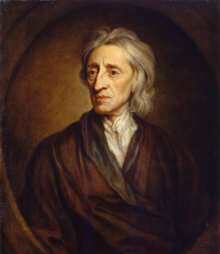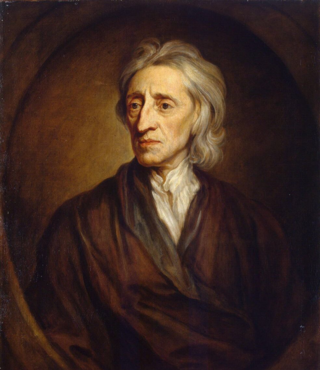ജോൺ ലോക്ക്
English philosopher From Wikipedia, the free encyclopedia
പതിനേഴാം നൂറ്റാണ്ടിൽ ജീവിച്ചിരുന്ന ഒരു ഇംഗ്ലീഷ് ദാർശനികനായിരുന്നു ജോൺ ലോക്ക് (ഓഗസ്റ്റ് 29 1632 - ഒക്ടോബർ 28 1704). ആദ്യത്തെ ബ്രിട്ടീഷ് ആനുഭവികത്വവാദിയായി (empiricist) അദ്ദേഹത്തെ കണക്കാക്കുന്നു. സാമൂഹിക ഉടമ്പടി സിദ്ധാന്തത്തിലും അദ്ദേഹത്തിന്റെ പ്രധാന സംഭാവനകളുണ്ട്. വിജ്ഞാനശാസ്ത്രം, രാഷ്ട്രീയ തത്ത്വചിന്ത മുതലായവയുടെ വികസനത്തെ അദ്ദേഹം കാര്യമായി സ്വാധീനിച്ചു. വോൾട്ടയർ, റൂസ്സോ, സ്കോട്ടിഷ് ജ്ഞാനോദയചിന്തകർ, അമേരിക്കൻ വിപ്ലവകാരികൾ എന്നിവരിലും സ്വാധീനം ചെലുത്തി. ഈ സ്വാധീനം അമേരിക്കയുടെ സ്വാതന്ത്രപ്രഖ്യാപനത്തിൽ കാണാനാകും[2]
 | |
| ജനനം | 1632 ഓഗസ്റ്റ് 29 റിംഗ്ടൺ, സോമർസെറ്റ്, ഇംഗ്ലണ്ട് |
|---|---|
| മരണം | 1704 ഒക്റ്റോബർ 28 (72 വയസ്സ്) എസ്സെക്സ്, ഇംഗ്ലണ്ട് |
| ദേശീയത | ഇംഗ്ലീഷ് |
| കാലഘട്ടം | പതിനേഴാം നൂറ്റാണ്ടിലെ തത്ത്വചിന്ത (ആധുനിക തത്ത്വചിന്ത) |
| പ്രദേശം | പാശ്ചാത്യ തത്ത്വചിന്ത |
| ചിന്താധാര | ബ്രിട്ടീഷ് എമ്പയറിസിസം, സാമൂഹിക കരാർ, സ്വാഭാവിക നിയമം |
| പ്രധാന താത്പര്യങ്ങൾ | മെറ്റാഫിസിക്സ്, എപിസ്റ്റെമോളജി, രാഷ്ട്രീയ തത്ത്വചിന്ത, മനസ്സ് സംബന്ധിച്ച തത്ത്വചിന്ത, വിദ്യാഭ്യാസം, സാമ്പത്തികശാസ്ത്രം |
| ശ്രദ്ധേയമായ ആശയങ്ങൾ | ടാബുല റാസ, "ഭരിക്കപ്പെടുന്നവരുടെ സമ്മതത്തോടെയുള്ള ഭരണം", സ്റ്റേറ്റ് ഓഫ് നേച്ചർ; ജീവിതത്തിലെ അവകാശങ്ങൾ, സ്വാതന്ത്ര്യം സ്വത്തവകാശം |
സ്വാധീനിച്ചവർ
| |
സ്വാധീനിക്കപ്പെട്ടവർ
| |
| ഒപ്പ് |  |
മനസ്സിനെക്കുറിച്ചുള്ള ലോക്കിന്റെ സിദ്ധാന്തങ്ങൾ വ്യക്തിത്വത്തെക്കുറിച്ചുള്ള ആധുനികചിന്തകൾക്ക് വിത്തുപാകി. ഡെവിഡ് ഹ്യൂം, ഇമ്മാനുവേൽ കാന്റ്, റൂസ്സോ മുതലായ ശേഷകാലചിന്തകരുടെ കൃതികളിൽ ഇത് സുപ്രധാനസ്ഥാനം നേടുന്നു. സ്വബോധത്തിന്റെ നൈരന്തര്യമായി വ്യക്തിത്വത്തെ ആദ്യമായി നിർവ്വചിച്ചത് അദ്ദേഹമാണ്. ദെക്കാർത്തിന്റെ ദർശനത്തിൽ നിന്നും ക്രിസ്തീയ തത്ത്വചിന്തയിൽ നിന്നും വ്യത്യസ്തമായി, മനസ്സ് ശൂന്യമായ ഒരു സ്ലേറ്റാണെന്ന് (tabula rasa) അദ്ദേഹം പരികല്പന നടത്തി. അതായത്, മനുഷ്യർ ജനിക്കുന്നത് അന്തർഗ്ഗതങ്ങളില്ലാതെയാണ്. അനുഭവത്തിലൂടെ മാത്രമാണ് ജ്ഞാനം ആർജ്ജിക്കപ്പെടുന്നത്[3]
അവലംബം
കൂടുതൽ വായനയ്ക്ക്
പുറത്തേയ്ക്കുള്ള കണ്ണികൾ
Wikiwand - on
Seamless Wikipedia browsing. On steroids.
